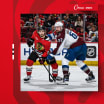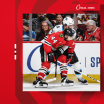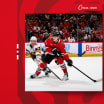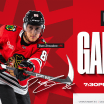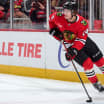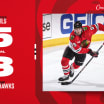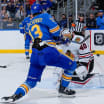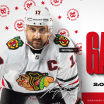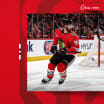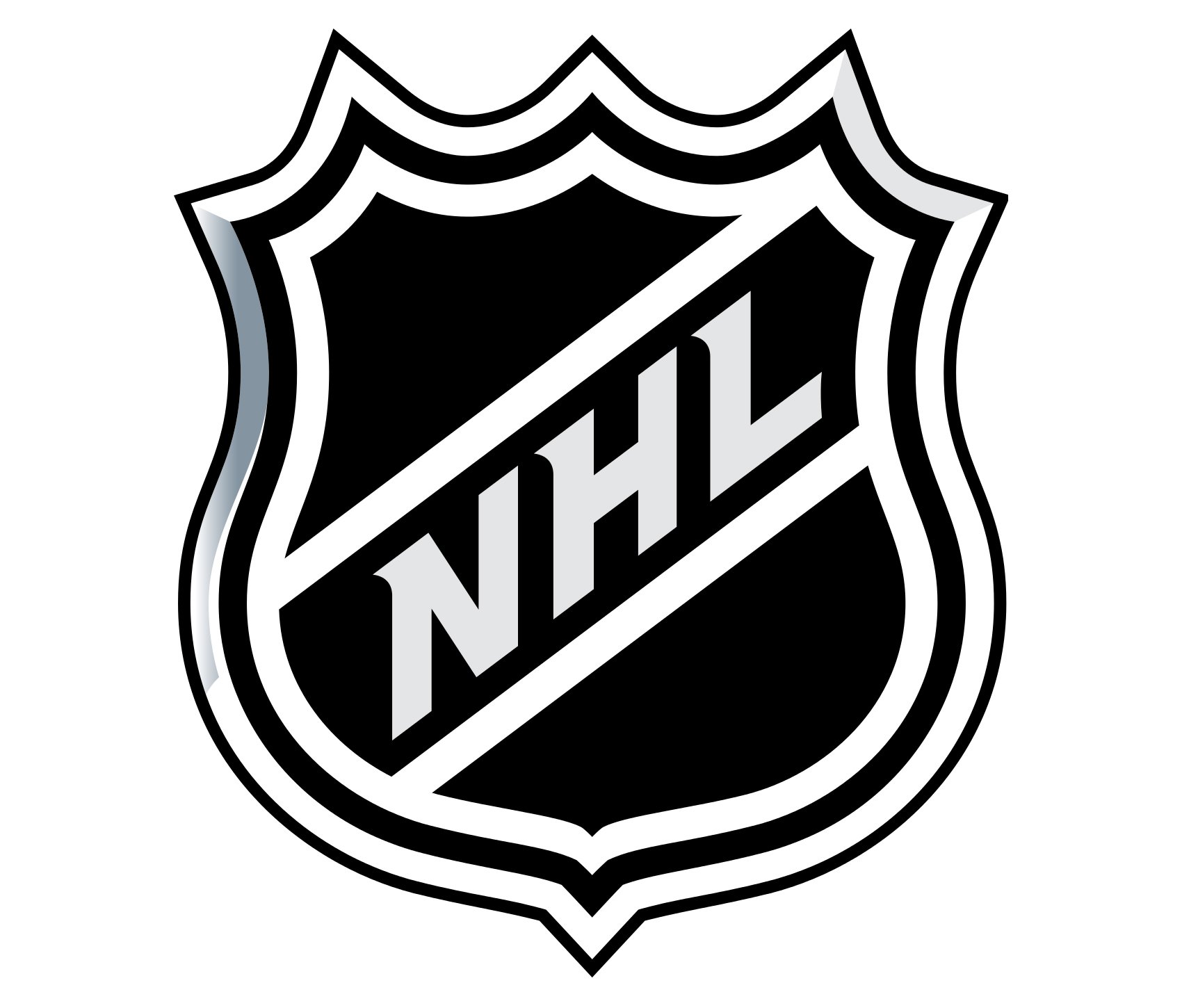Phil Esposito is on the phone, not doing well. He frequently joked about how he's the life of the party, while younger brother Tony was dour because of his occupation. Goalie. You know. Phil lit up a room and Tony emptied it. But that was all schtick, and now it's Phil who is shattered.
"Gone so fast," Phil rasped from his home in Florida. "I was gonna go up to their summer place in Wisconsin to fish. I told Tony that. He said, 'Come anytime, but don't bother fishing. You've never caught a fish in your life. Fish don't like you.' And we laughed. Oh, did we laugh. All the time. Take that mask off Tony, and he was hilarious. What a beauty. And gone. So soon. A few weeks ago, he called. He told me. Not good. Pancreatic cancer. Terminal."
THE VERDICT: On Ice and Off, Tony Esposito Brought Excellence
Hockey world mourns the loss of ultimate teammate and selfless friend Tony Esposito
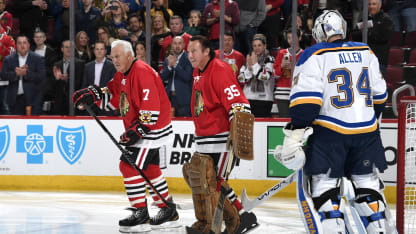
© Getty Images
By
Bob Verdi
Blackhawks.com
Phil paused. Silence. Did the line disconnect? No.
"This is typical," he went on. "Tony's instructions to his family were 'Don't make a big deal about this when it's over.' No public viewing sessions and all that crap. That was Tony. Private, just like he was about this rotten illness. But this is Tony too, and the respect he had. Bobby Orr called and said we gotta do something to honor him. Players from Russia, guys we wanted to beat their brains in at the 1972 Summit Series where Tony played so great, calling. So much respect for Tony, who treated people with respect. And so many laughs. Bobby's right. We gotta do something."
Tony Esposito died at age 78 on Tuesday. Chairman Rocky Wirtz of the Blackhawks
succinctly described
how Tony O blessed four generations of his family and four generations of fans with his spirited presence, as a Hall of Fame player, then as a team ambassador. He never did anything in a half-hearted way, whether it was stopping pucks in practice or washing his car. Meticulous, organized. You could surmise that he was a prisoner of routine, except that he was free to compartmentalize and pick any lane. He chose excellence. If he dressed up for a special occasion, the tie always matched.
"Listen to my phone in the background, ringing off the hook," Phil continued. "Vladislav Tretiak, their goalie, from Moscow. Alexander Yakushev, their dynamite forward. Respect. I was the one who would mouth off and tell people to go take a hike. Not Tony. Classy. But if you crossed him, you got that look. And if you were his friend, someone he could trust, he'd do anything for you. Plus, he took care of himself. I'm the fat one."
A native of Sault Ste. Marie, Ontario, Tony Esposito attended Michigan Tech. Hundreds of current players in the National Hockey League hail from American colleges, but he was among the initial wave when signed by the Montreal Canadiens. His first start occurred during the 1968-69 season against Phil's Boston Bruins, and it ended 2-2.
"I got a call from our parents after the game," Phil recalled. "They wanted to know how Tony did. I told them, good, real good. Second star. Frances, my mother, asked who scored the first goal against him. I told her I did. She said well, that's OK, you're his brother. Then she asked, who scored the second goal? I said, well, I got that one too. She said, 'How the hell can you do that to your brother?' She didn't talk to me for two weeks."
The Canadiens were loaded at the position with standbys Rogie Vachon and Gump Worsley. Thus the Blackhawks, two years after regrettably trading Phil to Boston, where he blossomed into a superstar, acquired Tony for the waiver price of $25,000. That sum was not pocket change at the time, and even General Manager Tommy Ivan could not have imagined that he would secure a heritage goalie for a decade and a half.
The Blackhawks desperately needed one. As Tony observed, having seen the Blackhawks during his brief tour in Montreal, they possessed considerable talent. But while finishing last the previous season, they had surrendered 246 goals in 76 games, by far the worst mark in the Original Six East Division, and more than two teams in a West Division composed of a half dozen two-year-old expansion clubs.
The transaction on June 15, 1969, was not headline news in Chicago. The Cubs were in first place by nine games. The Blackhawks were looking for answers after a difficult winter, and their fans were still stewing about the exploits of Phil, who was piling up big numbers for the Bruins.
Coach Billy Reay of the Blackhawks implored his players to be more responsible defensively as training camp convened, but that platform required improvement between the pipes. The journey did not start well. Esposito was beaten, 7-2, in the regular season opener, and in a matter of two weeks, the Blackhawks were 0-5. Frustrated Stadium customers serenaded Reay with chants of "Good Bye, Billy." It was ugly.
But gradually, Tony settled into a masterful groove. Energized by two other rookie collegians, Keith Magnuson and Cliff Koroll from the University of Denver, the Blackhawks gained traction. Iconic Bobby Hull and Stan Mikita were producing as always, while Esposito inspired confidence at the other end. Upon the New Year, the Blackhawks were competitive at 15-15-5, although still back in the pack of the East.
The Blackhawks then embarked on a surge rarely seen in the NHL. They lost just seven of their remaining 41 games, becoming stingier by the shift as Esposito gathered shutouts. He wound up with 15, still a modern record, and the Blackhawks clinched first place on the final evening on the regular schedule -- an unprecedented revival. The tidier Blackhawks allowed only 170 goals, exactly one fewer per game than the previous season, and for his ironman role, Esposito earned the Calder Trophy as best NHL rookie. He also won the Vezina Trophy, first All-Star status, and was runner-up for the Hart Memorial Trophy as most valuable player.
For winter after winter, until he retired in 1984, Tony O brought stability and reliability at hockey's most grueling domain. With 418 for the Blackhawks, he was one of only three goalies in NHL history to win 400 or more games with the same team. Fans attached to his acrobatic and athletic butterfly style, his darting right glove, his determination. Many a night, Tony O would ply a spectacular save that would cue Stadium fans to roar: "TO-NEE!! TO-NEE!!" He never showed his face, but they saw a competitor with focus and ardor. After a whistle, a linesman might mosey over toward Esposito's cage for a bit of housekeeping. Tony craftily arranged snow pilings beside each pipe, just atop either extended goal line. Perfectly legal pursuit of an edge.
"Guy from the other team tries to pass the puck from behind the net," he explained. "If there's a bunch of ice chips in the way, maybe the puck doesn't quite go where the guy wants it to go. Just trying to keep things neat."
As Wirtz praised in his statement about Esposito's passing, Tony O was an exceptional teammate. He played when his body was a mosaic of welts and bruises, when he had a migraine, when the Blackhawks in front of him were underwhelming. If one of them missed a check, or strayed from an assignment for no apparent reason, Esposito invariably would resolve the issue with a save. And if he didn't, if the puck found the net behind him, it was always his fault. Always. Even when it wasn't. "I just missed it," he would say. That goes a long way in establishing the desired fabric of a locker room. He was zero maintenance. Ownership and management loved him, as did the guys. The only time he pointed fingers was when it was time to go for lunch.
"Before he played," remembered Bill Gardner, who for a few years occupied a Stadium stall next to Tony, "he'd smear this gooey hot balm all over himself to get loose. Nobody else could stand how it burned. Everybody's laundry, when it came back clean, was white. His was red."
Esposito was fastidious about equipment -- imagine him sewing, after stuffing, his pads -- passionate about preparation and somewhat superstitious. On game days, he excused himself from society. If wife Marilyn ever craved to be alone, she could always depend on their drive to the Stadium. But while Tony stepped into an insular zone, Marilyn held firm as no less than co-star of the partnership. Despite their lofty perch in the presumed pecking order, they never big leagued anybody. Marilyn was as impressive in the wives' room as her man was at his post. If you were the spouse or girlfriend of a Blackhawk, or parents visiting, Marilyn made sure you knew you belonged.
If either of them, Tony when he was off duty or Marilyn always, sensed that a rookie might dread having dinner alone in a strange city, theirs was an open house. Christmas parties included everybody. Trainers, stickboys, doctors. When Tony let go of the pressure, he was just a regular guy, a buddy. And helpful. A kid makes the team and needs to buy a suit? See Tony. A suit at a really good price, a bargain? Definitely see Tony. He was unfailingly loyal and genuine, yet private in a way that was admirable, not standoffish. Tony, Marilyn and their two young sons, Mark and Jason, settled in Elmhurst. Gradually, more Blackhawks bought houses in Elmhurst. Pure coincidence? Possibly, but we think not. Mark's now a pilot, Jason a restaurateur. Fine young men.

Video Player is loading.
Current Time 0:00
/
Duration 0:00
Loaded: 0%
0:00
Stream Type LIVE
Remaining Time -0:00
1x
- Chapters
- descriptions off, selected
- captions settings, opens captions settings dialog
- captions off, selected
- Unknown Captions
This is a modal window.
Beginning of dialog window. Escape will cancel and close the window.
End of dialog window.
This is a modal window. This modal can be closed by pressing the Escape key or activating the close button.
STL@CHI: Phil and Tony Esposito honored in Chicago
When Tony put away the gear in 1984, he appropriated it to a dark place. As his legendary predecessor Glenn Hall often mused, retired goalies rarely yearn for more hockey when they've already had enough. Tony exited having earned three Vezinas, 74 shutouts, and four years hence was a cinch inductee into the Hall of Fame. Shortly thereafter, he served as general manager of the Pittsburgh Penguins, where he engineered a trade for Tom Barrasso. He backstopped the Penguins to a Stanley Cup in 1991, throttling the Blackhawks in the Final. He won another Cup in 1992 and toasted his mentor, Tony O.
Then -- after Tony's initial response to Phil's proposal was "are you crazy….hockey in Florida?" -- the Esposito brothers
basically founded the expansion Tampa Bay Lighting
. Phil's job as president was to promote and sell tickets. Tony, the talent maven and executive handyman in charge of details, oversaw the drafting of Vincent Lecavalier, an early Lightning star, and also found Brad Richards in the third round. Richards was the Conn Smythe recipient on the Lightning's first Stanley Cup team in 2004, and later contributed to the Blackhawks' 2015 champions.
By then, Tony O was back with the Blackhawks. His No. 35 jersey had long before been raised above the United Center, and in 2008, he was appointed an official team ambassador, along with Hull and Mikita. Esposito could have regarded the assignment as a ceremonial thanks for stopping all that rubber, but that wasn't Tony. As Rocky said, Tony did whatever was asked of him and thensome, shaking a complete stranger's hand because it was the proper thing to do, signing but not scribbling thousands of autographs, or writing the forward to Wirtz' book, "The Breakaway." Rocky knows a lot of powerful and famous people. He chose Tony. In 2019, the Esposito brothers partook of the Blackhawks' ingenious "One More Shift" celebration. Phil's objective was not to fall on his skates, Tony's problem was finding his midst the cobwebs. Remember, former goalies are happily former.
"That sound, that laugh," Phil concluded, noting the slightly higher pitch of Tony's voice, not unlike Walter Payton's. "When he was just hanging out, away from the rink, letting go. Just so much fun to be around. Easy for me to say, because he was my brother. But ask anybody. Ask his teammates, ask his neighbors. Laughs, a few beers, and more laughs. We'll laugh again about Tony, but not with him ever again. And we're not laughing now. Someday. But not now. Not today or tomorrow. So fast. So soon. Gone."



